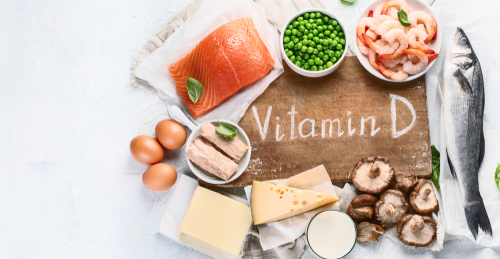Vitamin D Foods: Seafood, and Your Immune System
New Report Reaffirms Seafood’s Important Role in the Diet
The 2020 Dietary Guidelines Advisory Committee recently put out a Scientific Report reaffirming the well-established, lifelong benefits of eating seafood—from boosting brain and eye development in babies to supporting heart and brain function and a healthy weight for adults. But, what about vitamin D foods?
Most people know that seafood is good for them (even if they don’t eat the recommended 8-12 ounces or 2-3 servings weekly), but much of the attention understandably focuses on the powerhouse omega-3 oils found in fish, which are especially important for pregnant mothers and their children.
Vitamin D Foods: Seafood is a Rare Natural Source of it
Less widely touted: seafood is one of the few natural sources of vitamin D. The 2020 Dietary Guidelines Advisory Committee’s Scientific Report designates vitamin D as a “nutrient of public health concern” because nearly all Americans—94 percent—aren’t getting enough of it. While your body synthesizes vitamin D with the help of sunlight, there are many reasons why some people may be deficient. Individuals who have dark skin, malabsorption issues, are older or live north of Atlanta, GA during the winter months are more likely to be vitamin D deficient.
In addition to sun exposure, we can get vitamin D through the diet. Some foods are “fortified” with vitamin D, meaning it is added during processing. But, some seafood—like salmon, trout and tuna—offer natural levels of vitamin D that may be higher than fortified foods, like cereal.
Why are Vitamin D Foods so Important?
Vitamin D works with calcium to strengthen bones and enamel. The Committee’s Scientific Report also highlights research showing vitamin D and calcium may work together to reduce the risk of high blood pressure during pregnancy and preterm birth.
Vitamin D and Immunity
There is also emerging science that vitamin D plays a critical role in your immune system.
In fact, a lack of vitamin D is associated with increased susceptibility to infection, as summarized in The BMJ (British Medical Journal) in April:
- “One factor that affects immune responses with increased age is reduced serum levels of 25-hydroxyvitamin D (25(OH)D), the biomarker used to assess risk of vitamin D deficiency and suboptimal dietary intakes. The seasonality of many viral infections, especially in cold weather in winter, is associated with low 25(OH)D concentrations as a result of limited exposure to sunlight. The metabolism and actions of vitamin D are well known. Vitamin D3 is produced in the skin and plays a key role in the immune systems, the highly complex mechanisms in the body that are designed to help protect people against a host of infectious agents, including bacteria and viruses. People who are self-isolating or unable to go outside into the sunshine, people living in regions impacted by air pollution, people who are malnourished, overweight or obese and those with low baseline 25(OH)D concentrations are likely to have weakened immune systems and functions and be at increased risk of viral infections.”
Vitamin D and Covid-19
Recently, researchers have focused on whether vitamin D plays a role in people’s susceptibility to the novel coronavirus.
- The Mayo Clinic summarized a University of Chicago study of 489 people which “found that those who had a vitamin D deficiency were more likely to test positive for the virus that causes COVID-19 than people who had normal levels of vitamin D.” Another study observed “high rates of vitamin D deficiency in people with COVID-19 who experienced acute respiratory failure.”
- A Boston University School of Medicine study published in PLOS One reported similar findings:
- “Hospitalized COVID-19 patients who were vitamin D sufficient, with a blood level of 25-hydroxyvitamin D of at least 30 ng/mL (a measure of vitamin D status), had a significant decreased risk for adverse clinical outcomes including becoming unconscious, hypoxia (body starved for oxygen) and death. In addition, they had lower blood levels of an inflammatory marker (C-reactive protein) and higher blood levels of lymphocytes (a type of immune cell to help fight infection).”
- ‘This study provides direct evidence that vitamin D sufficiency can reduce the complications, including the cytokine storm (release of too many proteins into the blood too quickly) and ultimately death from COVID-19,’ explained corresponding author Michael F. Holick, PhD, MD, professor of medicine, physiology and biophysics and molecular medicine.”
USA Today notes that although the exact role of vitamin D in immune response is still being determined, it is thought to help turn on certain genes on “to become more efficient at killing pathogens.”
USDA: Adequate Intake of all Nutrients, including Vitamin D
The Advisory Committee’s Scientific Report takes an “all of the above” approach to encouraging adequate intakes of all nutrients, including vitamin D. If you’re looking to get more vitamin D through diet, eating seafood is a no-brainer. Plus, seafood boasts other important nutrients that help reduce inflammation and support a healthy immune system, like protein, omega-3s, vitamins and B, iron, zinc and selenium. It’s no wonder that experts recommend Americans include fish more often as a source of protein on their plates.
It’s also important to remember that a healthy immune system will not prevent a person from getting Covid-19. The CDC recommends wearing a mask, proper handwashing, social distancing and other measures needed to help stop the spread of the virus.


